The Checker Maven
The World's Most Widely Read Checkers and Draughts Publication
Bob Newell, Editor-in-Chief
Published each Saturday morning in Honolulu, Hawai`i
Contests in Progress:
Lucky Day
Our automated system was mis-programmed and published two articles today, including next month's installment of Checker School. It's our readers' lucky day, so enjoy the extra article while your editoral team scrambles to write another for the month of May!
Checkercycle:Video Instruction on the Web
What would you think about watching some videos to help improve your checker play? Wouldn't it be great to have someone talk you through a game played by the masters, or describe how to win a difficult ending? It'd be the next best thing to having a personal tutor.
We're happy to report that checker video instruction is alive and well on the internet! The YouTube media site contains a substantial and growing collection of instructional material, but one name stands out: Checkercycle, the creator of dozens of video tutorials of unquestionably high quality.
Now, we know who this gentleman is, and with the serious checkers crowd in America being a relatively small fraternity, you might know too. But we note that in his videos, Mr. Checkercycle's face is seldom shown, so we're not telling, even though the info he gave us in an email interview will surely give away this not so well-kept secret. Here's the discussion we had with this extraordinary man of checkers.
CM: You are clearly a knowledgeable player. Do you play tournaments? Have you won any titles or the like?
CC: I played in the NYC 2005 3-move and won 1st place in the minors. I was also in the 2007 Yonkers Open GAYP, taking 2nd place, and in the Jim Morrison Nationals in 2009, taking 3rd place in the majors.
CM: You must have a good checker library. Tell us about it, and how you obtained it--- a difficult thing these days.
CC: My first book was The Wonderful World of Checkers and Draughts by Tom Wiswell, which I got the from the library. I then got Straight Checkers Gold from Al Lyman, which had about eight books in the teaching program. I then started going to Checker Maven and Jim Loy's site, and as I found out more information thanks to these great sites, I started buying books from Amazon and ABE.com. My friends bought me books at the tournaments and I bought them also; we helped build each other's collections. I liked all the Tom Wiswell and William Ryan books. I like the Richard Pask and Robert Pike's books too. It is hard to get books and that is something I would like to change. I am happy that I will be able to buy the Basic Checkers at the National Tournament. The fact that it also supports the youth is such a beautiful thing and I would like to thank you for your hard work.
CM: What got you interested in making tutorial videos?
CC: One day I was showing my friend a game I played on the internet on a small magnetic board and he made a video of it. I thought how nice it would be on a big board, and because books are so hard to get, I could encourage others people to play this fine game. I kept on trying to come up with new ideas as I went along.
CM: How many videos have you made?
CC: So far I've made about 50 videos.
CM: How's the response been--- lots of viewers, feedback, etc.?
CC: At first I got very few comments but the ones I did get were positive. Then I got some more feedback, and I listened to what the players were telling me and asking me to do. I have to give them a lot of credit for their ideas.
CM: What's in store for the future for Checkercycle?
CC: I am looking forward to playing in the National Checker tournament on August 1st in Springfield, Illinois. The people I have met have been great. I had the pleasure of playing a 96 year old gentleman last year and meeting many great people. It was a lot of fun and I'm looking forward to more tournaments. I'd like to continue doing video and I'd like to improve my game along the way. I always want to help people play checkers and see the beauty of the game. I feel that exercise, checkers or chess and socializing is a good way to stay young and I have that 96 old gentleman who is still playing in tournaments as a fine example. (He did beat me in our contest that day.) He must have some great stories to tell and I hope I get to hear them.
CM: What do you think is in store for the future of the game itself?
CC: The game should continue to grow because of the internet, and the many devoted people from the ACF, and the people who help tell the stories and make the game so enjoyable like the Checker Maven. I know that it not easy with so many different games and with the popularity of chess. However I think checkers and chess are very good games and a lot of fun.
CM: Any advice to the up-and-coming generation of checker players?
CC: The next generation of checker players could really be outstanding, and with the help of computers, videos, checker sites and the support of the checker clubs, we could see the next masters be younger and be equal to the great players of the past. Only time will tell. The tools of learning the art of checkers are being happily shared with the young and not so young players . The beauty of the game, the fun of the game has always been there to enjoy for everyone.
CM: Anything you'd like to add, say, recommend, etc.?
CC: I started playing checkers when I was about 7 years old with my Dad, and we played for hours at a time. When I came out of the Army I continued to play checker games with him. I will always have that memory and will cherish it. The internet came along and gave me the chance again to play the game that I grew up to love.
Checkercyle's home page on YouTube can be found here, and we highly recommend that you go there and take the time to view the material he presents so effectively in his video presentations.
And now let's try a problem, taken from Checkercycle's video on the classic Payne's Draw. The position is shown below.
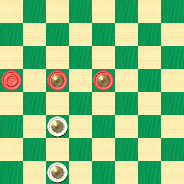
WHITE
Black to Play, White to Draw
B:B13,K14,K15:WK22,K30.
Try it out and click on Read More to see the solution. Then be sure to check out Checkercycle's other great checker lessons. You'll be glad you did and we'll guarantee that you'll learn something.![]()
Checkers in Hawai`i: A Grand Success

Mililani Town Center, Mililani, Hawai`i
In an earlier Checker Maven column, we reported on what was then the upcoming unofficial Hawai`i State Checker Tournament, to be held at the Mililani Town Center in Central O`ahu. Today, we're happy to report further that the tournament was a grand success with an excellent organizational effort turned in by tournament director Geoffrey Pang.
The tournament took place on July 24, 2010, in the gazebo area of the Town Center. Nine adults and seven youth players turned out on a warm and sunny Hawaiian summer morning, with just the gentlest of cool breezes to accompany some very hot checker action.
Play took place in two sections, adult and youth; the format was single-knockout, random pairing, with each match played for the best of five games. The finals in each section were best of seven. Director Pang was aided by assistant tournament director Brandon Ho and a number of game referees. A Go-As-You-Please tournament open to all skill levels, the Director told players that the only real requirement was to have a good time and enjoy the games.
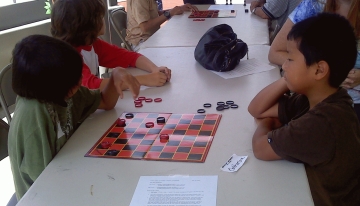
Keiki Division Championship Match
Action was fast and furious as with each successive round, the field got smaller, finally narrowing down to just two players in each section. It was time to play for the championship! The Keiki (children's) Section championship round came first. Championship contestants were Kobe and Prescott (in conjunction with our publication of photos, we only give first names for the protection of the children). After a spirited struggle, Kobe won the match, a $50 gift certificate, and the title of Unofficial Hawai`i State Keiki Checker Champion. Prescott won the title of runner-up and a $25 gift certificate.

Kobe is the Keiki Champion
The adult section finals took place between veteran player Harold Afuso and none other than your Checker Maven editor. Play went the full seven games with one win each and five draws. A sudden death phase then took place, and Mr. Afuso won the next game to become Unofficial Hawai`i State Checker Champion. With the title went a $100 gift certificate. Your editor was declared runner-up and received a very nice $50 gift certificate.

Harold Afuso, Unofficial Hawai`i State Checker Champion
And did the players have fun? If the photos in this column don't tell you that clearly enough, you can view our full, unedited set of photos here.
Director Pang describes himself simply as a checker enthusiast who wishes to promote checker play. Clearly, much time and effort went into this tournament, and Mr. Pang feels it was worthwhile. He is already planning next year's tournament, with an eye to working with the American Checker Federation to have the next tournament winner recognized officially as State Champion.
The Checker Maven thanks Mr. Pang for his efforts in promoting the great game of checkers in beautiful Hawai`i. We also want to thank the Town Center of Mililani for their civic-minded support of the tournament. Not only did they provide space and logistical assistance (at no charge), they donated $225 in prize money in the form of gift certificates. Hawaiian checker players certainly owe these folks thanks and patronage in recognition of their spirit of aloha.
Games weren't recorded, but we noted that the 9-14 Double Corner opening was seen frequently (and rather surprisingly). We looked through our library and found a game that was quite similar to one that we recall being played in the tournament. We'll give you the run-up to the diagram below and then ask you to finish the game by finding the winning path.
9-14 23-18 14x23 27x18 12-16 18-14 10x17 21x14 6-9 14-10 7x14 22-18 14x23 26x12 11-15 25-22 8-11 29-25 1-6 24-19 15x24 28x19 6-10 22-18 4-8 25-22 9-13 31-27 2-6 27-23 11-16 30-25 5-9 18-15 10-14 25-21---A
A---22-18 was necessary here for White to draw.
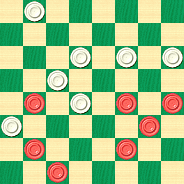
BLACK
Black to Play and Win
B:W32,23,22,21,19,15,12:B16,14,13,9,8,6,3.
Now, picture yourself in Hawai`i at the Mililani Town Center gazebo. It's about 11 AM, the temperature is around 84 F, and there is a soft breeze off the mountains. It's your move. You're playing for the state championship and a very nice first prize award. And once you wrap up the game, you know you'll head back to the south shore for a cool drink, a swim in the Pacific, and a relaxing couple of hours on the beach. So let's get on with it!
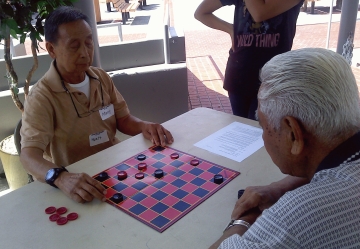
2nd Round Action in the Adult Division
Cinch the win, then click on Read More to check your solution. And if you couldn't make the tournament this year, plan a Hawaiian vacation for tournament time next year. You won't be disappointed!![]()
Relocation Complete!

Our containers have been offloaded and unpacked, and the relocation of our main Checker Maven office from Santa Fe to Honolulu is at least relatively complete; there's always more to do and we wonder if anything like this is ever really quite finished. It took a little longer than expected, which again is not a big surprise, but we're happy to be here and to have a long and complex move behind us.
As we've said before, our parent company, Mr. Fred Investments, couldn't continue to maintain two locations for a subsidiary that was never intended to make a profit (and surely doesn't!). This has been our second downsizing, but it's been, we hope, without sacrificing content or quality. And now, with the economy beginning to come back at least somewhat, we look forward to a bright future. Thanks for staying with us.![]()
Moving Day

During the coming week, The Checker Maven is relocating full-time to Honolulu, Hawai`i.

Our Santa Fe offices closed permanently on February 26, 2010. Business will resume in our Honolulu office on March 8 at partial capacity; we expect to be back to full operation before the end of March.
We will of course publish a new column each Saturday morning during the transition, without interruption or delay.

We've had a great run in Santa Fe, but it's time to move on and consolidate in the interests of reduced costs and efficiency.
Catch you soon at our Honolulu office.

![]()
5th Anniversary Edition

This week The Checker Maven marks five years of continuous, uninterrupted, on-time publication. It's a milestone reached by just the smallest fraction of web sites, and we take what we believe is justified pride in our achievement.
Our original business plan called for ten years of publication. We're halfway there, and G-d willing, we'll travel the rest of the distance, and perhaps even continue on past that point. We can't predict the future, so we'll just keep publishing, one week at a time, for as long as fate and fortune allow.
Some very big changes are coming, but hopefully you won't notice them. No, we're not going to change our format (though we've thought about it); we know you like the familiar appearance of our weekly columns and we aren't going to "modernize" our look or create confusion by moving everything around. Neither are we going to abandon our weekly Saturday morning schedule--- you've told us how you look forward to the weekend and your Saturday cup of coffee with The Checker Maven.
But we are going to close our Santa Fe office, and transfer all of our operations to our Honolulu location. This will happen around March 2010. Like so many companies in America these days, our corporate parent, Mr. Fred Investments, is "reducing its footprint" as they say, and the bottom line is that we can no longer maintain two office locations for an operation that produces only very limited indirect revenue.
We're grateful to you, our reader, for staying with us for so long. The Checker Maven would be pointless if no one ever visited our pages. But you do visit, several thousand of you each and every week, and that keeps us going. Thank you to every one of you for five great years, and here's to the next five!
And now, as a special fifth anniversary feature, we present a new work of checker fiction, a 3,000 word short story entitled "Once Again to Knighton." We hope you enjoy it.![]()
The Online Museum of Checkers History
Do you suppose that this is the general public's idea of a Checker Museum?

Unfortunately, much of the general public has these kinds of inaccurate ideas about the game of checkers; and since the untimely fire at the International Checker Hall of Fame in Petal, Mississippi, there hasn't been a true checker museum in operation to set forth the truth of the matter.
At least, not until last year, when the high-tech alternative, The Online Museum of Checkers History opened its virtual doors.

OMOCH, as it is often abbreviated, is the product of the labor of Jay Hinnershitz, Liam Stephens, and Ken Lovell, a trio of checker experts and historians determined to save valuable artifacts of the game of checkers and make them available on the internet to the worldwide community of checker enthusiasts.


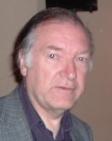
Jay, Liam, and Ken
The OMOCH business model is simple and practical. Contributors submit photos or scans of their checker memorabilia, and OMOCH presents them in an attractive on-line format. Look, for instance, at this incredible photo of a young Gonotsky and an even younger Willie Ryan, with J. G. Finley looking on. It's one of dozens of such exhibits found on the OMOCH web site.

Jay Hinnershitz is the primary architect of OMOCH, and he granted The Checker Maven an exclusive email interview. We asked Jay a number of questions about the museum, its background, its future, and how it came to be. (Jay asks us to point out that the opinions he expresses are his alone and are not necessarily OMOCH editorial positions or the views of the other OMOCH editors.)
What gave you the idea for the Museum?
The forerunners of the OMOCH were my "The History of a Book" and "From Earl Hangen's Scrapbook" posts on the ACF Forum. Earl's entire collection of books, boards, photos, etc. were either auctioned off, or were going to be trashed. I got my hands on most of his collection, and wanted to share with the rest of the checker playing community. I could do this best by posting on the ACF Forum.
By the way, Earl Hangen is a personal hero of mine; not a macho man, never anything more than a very humble, hermit type of guy; but, up until recently, he lived his life in exactly his own way ... the way he wanted to ... what more could any man ask for ??
The idea for the museum began when I kept having trouble posting on the ACF Forum. Something was wrong with Forum, and it was not fixed for several months. Posts were being truncated, and no reasoning was being given. Liam was having the same trouble. I thought about starting a website then, and was kicking the idea around. Then when Kim Willis (the current ACF treasurer) proposed something on the ACF Forum about starting something to replace the recently destroyed ICHF, I just took her idea a step further. The seed was already planted; Kim was the water that made it grow. When Liam agreed, it was full speed ahead.
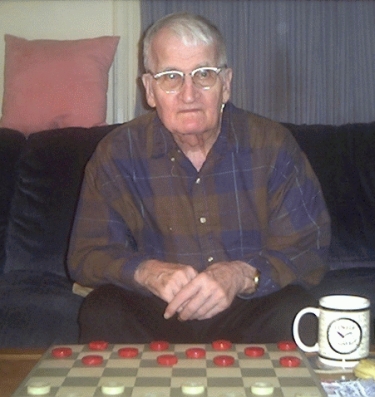
Earl Hangen
What are the Museum's goals?
Just as the slogan says: "Promoting the Future of Checkers and Draughts, by Glorifying its Past !" There is no other site on the web devoted exclusively to this concept (for our version of the game, anyway).
I knew the Beijing games were coming up, and that these games might generate some public interest. I wanted to have available, for anyone interested , the chance to see that, "Yes, the game does have a recorded history."
This will, I hope, help with the notion that there is still some pride amongst the players and/or organizers of the game, to the general public, as opposed to the concept that Schaeffer (architect of Chinook) created with his "Checkers is Solved" campaign, which caused a public and media denouncement of the game.
Checker material is getting harder and harder to find. Did you ever expect to be able to pull together such a large and growing collection, such as you now have online?
I agree that it is getting harder and harder to find Checkers/Draughts related material. I am very proud of the material that the OMOCH has on display. But, I am disappointed in knowing that there are many large collections of historical items out there, but the owners won't display them, either here or anywhere else.
I have statement from one major historian on the game that he , alone, could "triple the contents of the site" and yet would not contribute one single item. And, I have had many promises of items and exhibits, that quite simply, were not kept...so, what are you going to do?
I have more, Ken Lovell has wrote that he has more, and Liam just wrote me that he has several un-opened boxes (!) of material. So, just between us OMOCH Editors, we will have more; but I would still like to see more submissions from the community. Perhaps potential submitters are too modest, or think their items won't be used.
As I stated in the OMOCH submissions page, we are not looking for things of great monetary value, but something that maybe captures a moment in time. And, maybe even a personal Checkers/Draughts related moment in time. Maybe you still have the board you played your first game on ... send it in, we will use it !!

Classic Checker Set
How much time you estimate you spend working on the Museum each month?
I am still, three years after the fact, going through Earl Hangen's collection and finding things to use on the Museum part of the site. I am constantly searching for historical info from my library of books. This, on top of the time I actually spend editing the site, puts me up there in hours. I have had a few down weeks , but for the most part, between 10-15 hours a week. I have already done weekend marathon sessions on the site where I placed 20 hours editing between Friday and Sunday Nights. And,I am always looking for mistakes and correcting them .
Do you get a good audience?
Not the audience I expected; again, there are many I hoped to hear from and (have) contribute.
But, I have heard from the great,great, great granddaughter of Henry Hutzler, the daughter of Rudy Munzinger, the grandson of Fred Vore, the granddaughter of Paul Ottey, the granddaughter of Rex Wood ... this is amazing! People that just googled their ancestor's names, and ended up on the OMOCH, and write me thanking me for remembering the parents, grandparents, etc. This alone makes the effort worthwhile, although the main purpose is to promote the game.
The low point was receiving an e-mail form the official ACF court jester (oh, I am sorry)--- the official ACF appointed website journalist--- condemning the site, insulting the editing and/or editors, and generally "telling me off" as my son, who read the e-mail, explained it to me. Some people, eh?
How do you and your collaborators divide up the effort?
Why ... do you have some spare time on your hands ? (laughs) I have given free reign to both Liam and Ken to do as they please. I rarely, if ever, edit their work, only to correct a typo I might find. And, I have been doing the formatting for the exhibits, and writing the descriptive text.
Liam did almost all of the 1980-2000 Timeline entries himself; Ken made many image and info additions to the earlier timelines. Whatever strikes them, they can do. I am always available for technical help, and if I cannot figure it out, I have my son, who has assisted greatly in this capacity.

What are the directions in which you'd like to take the Museum in the future?
Just keep on going, trying to show the world the history of the game as we know it.
I am concerned. I have read on the ACF Homepage that Charles Walker is planning to start work on the ICHF again. (BTW, it needs to be mentioned that the OMOCH is not affiliated with the International Checker Hall of Fame, although at the launch of the OMOCH, I was forwarded a letter of support from Walker.) I wonder if some are saving their items to donate to the ICHF when it gets up and running, because several that publicly, openly, promised to submit some items never have.
Do you have any thoughts about where the game of checkers is headed?
Without fanatical fresh young American blood, the game could be in trouble over here in America. Definitely, the Internet has piqued the curiosity of some younger players, who have tried it and found out that there is more to the game than "meets the eye," or more than what is portrayed by the news media, i.e., that the game is played by old men, or that it is "solved" --- nothing more to it than a game of Tic-Tac-Toe. This is the result of the Schaeffer publicity campaign, that being that the game is no longer being compared to Chess, it is now being compared to Tic-Tac-Toe.
I have actually heard this stated: "Checkers is played by kids whose parents cannot afford to buy them any more at Christmas time than a two dollar set of checkers." This type of thinking must be changed, or the game's organizations will be in trouble.
Do you have any ideas about how it might be revived?
Yes: we need to make superstars of the young players, make the recognition they receive something that is coveted by all the other young players, such as it is for other celebrity/sports/music etc. superstars. Then more and more will want it ... make being the best player something they all want ! Make the championship something they want!
Look at what Ron King did for the game in Barbados. He is a SUPERSTAR, and the game thrives there because the kids want what he has.
Incidentally, pushing stardom on a youngster could be a problem. One example: last year, I threw some kudos and accolades to young Colton Cardie on the ACF Forum, and immediately, another of the American youth came and threw insults and questioned the legitimacy of Colton's accomplishments, probably jealous of the recognition that Colton was receiving. In my mind, the ACF should have jumped in there and tried to promote a match there between the two. The winner would have had some bragging rights, and that is what this game needs; some fanaticism about playing and winning.
We may, initially in such a campaign, have to compromise certain qualities, and behavior, that is expected from the youth, meaning common courtesy, respect and decent behavior. But, hey, they really don't have these qualities anyway. I don't see a problem with making a sacrifice of something that really does not exist, even within a lot of the "adult" members of the checkers/draughts playing fraternity.
One example of this lack of civility: Ron King's statement that he "is going to destroy Alex" from a few years back. The only thing that actually prevents him from making this statement again is that Alex destroyed him in their two 3-move matches. But it did not stop him from making negative remarks about Kondlo after their Freestyle match last year. If we can excuse the champions for this kind of behavior, then we need to get over the notion that the younger blood, the true "future of the game," has to behave like little angels in order to get support from the game's organization. This I stand behind very strongly !

Tinsley and Langon, Lakeside 1975
Who do you think was the greatest player in checker history?
Marion Tinsley, if for nothing more than his amazing list of accomplishments. More amazing is that he was head and shoulders above all other players at a time when grandmasters roamed the country, looking for tournaments to win. He played them all, and beat them all
The greatest player today?
Alex Moiseyev, without a doubt. In fact, I believe the only thing that prevents him from ever having a chance of being one of the greatest players ever is the lack of serious grandmaster competition available to him.
Do you play a lot of competitive checkers yourself?
Not since my last sojourn into Mail play, in the mid-to-late 1990s. I play on Yahoo occasionally; I play a few crossboard games with Earl Hangen. I enjoy the game as I see it: solving some problems, playing through some games while doing my research for the site and the like. I will, eventually, get to the point where I am content with the OMOCH site, the children will be grown and out of the house, etc. I will then study again, with an attempt at some crossboard tournaments. It will happen, just cannot say when.
Anything you can tell us about Jay the person?
Married, father of two with a step daughter, youngest of nine siblings, Christian, German parentage ,truck driver, musician (drums), artist (pen and Ink fantasy type work), very much American, very much male, checkerist.

The Checker Maven thanks Jay for his extensive commentary. We hope you enjoyed reading about OMOCH and will be inspired to pay a virtual visit soon.
Of course, no Checker Maven edition is complete without a game or a problem, and so we'd like to pass along one of Jay's best. It's a game he played himself, and here's what he has to say about it.
"It is the first game I ever won during my days as a mail player, from 1986. It was contested against Dan McGrath, from the Bethlehem, PA. area, during the 1986 ACF District 3 mail tourney. McGrath was a former American Mail Play Champion, and was well known and respected for many years, by even such as Dick Fortman, who met McGrath at the 1958 US National in Bethlehem, PA.
Anyway, as I played most of my mail games 'cross board' style, most of them went into the wilderness very early ... not that I was trying to lead my opponents this way. I just always (at the time) considered my mail games as practice for the eventuality of my becoming a crossboard player.
I remember showing this to Earl Hangen at the time, and he congratulated me. He wrote me that 'to win a game from McGrath is more than I (Hangen) have ever done, and I have played him many times.'"
Black: Jay Hinnershitz
White: Dan McGrath
11-15 23-19 9-13 22-17 13x22 25x11 7x23 26x19 8-11 27-23 5-9 29-25 9-13 25-22 11-15 24-20 15x24 28x19 4-8 30-26 8-11 19-16 12x19 23x7 2x11 22-18---A
A---22-17 would have drawn.
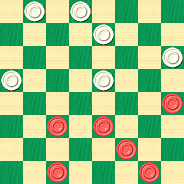
BLACK
Black to Play and Win
B:W32,31,26,21,20,18:B13,11,10,6,3,1.
Visit the Museum first; next, solve the problem; after that, click on Read More to see the solution; and finally, visit the Museum again. There's a lot to see and we're sure you didn't catch it all the first time.![]()
La Reina de Damas en Mexico
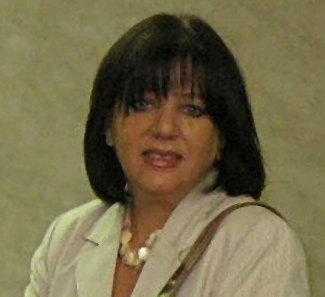
Una senora llamada Irma Sierra vive en la ciudad de Guadalajara, y ella es la reina de damas en Mexico.
Or, to paraphrase, a lady named Irma Sierra (full name Irma Alicia Sierra Noriega) lives in the city of Guadalajara, and she is the veritable queen of checkers in the warm and charming country of Mexico.
Irma granted The Checker Maven an exclusive interview, and we're most pleased to share with you a little about one of the most colorful women in checkers. This column is the first in a projected series that we're calling Contemporary Women in Checkers. We hope you enjoy it, and we hope that in some small way we can help to encourage more women to take up the great game of checkers.
Irma's native language, of course, is Spanish, but she is completely fluent in English and we present her comments here virtually unedited. Brava, Irma, you are a linguist as well as a checkerist! Irma is also a wife, mother, and grandmother, and she balances these traditional roles with a busy travel schedule which includes checker tournaments whenever possible.
Checker Maven: How did you get interested in playing checkers?
Irma: When I was 48, I started to use the computer for the first time, and a friend and I were playing checkers in Messenger, and we saw an advertisment: MSN Games by Zone. I went there and started to play checkers for the first time in my life. I kept playing because I fell in love with checkers...
Checker Maven: When did you learn the game?
Irma: There was a guy with the nickname Chumpchange in the social room of Zone, a very nice person, and he became my friend and taught me some moves.
Checker Maven: What lead you to becoming a serious checker player?
Irma: Well, when I started to beat some "guests" (those were the serious players in the social room in Zone) i decided to go to Kings Room where the serious players were. I had to beg to get a game, and there it was where I met my friends that invited me to participate in a tournament in Lebanon Tennessee, and I dared to go! Vonda Jones ("Bugs") and Ken Christan ("Redeyechecker") went to pick me up at the airport, and I had to remember how they looked just from the pictures I had seen on the NCCheckers site, they never saw me passing through until I saw them. It was very nice and fun!
Checker Maven: How is Mexico as a checker playing country --- are there many players and are there many good players?
Irma: Here in Mexico I didn't know anybody who played checkers, only my friend and I, but on the internet there are a few others and some are very good checker players, like Gilberto Cisneros. He went to the Nationals in Las Vegas in 2008, and there are I am sure others that I do not know. But you have to understand that in Mexico it is usual to play Spanish checkers, and not American checkers.
Checker Maven: Do many women play checkers in Mexico? What do Mexicans generally think about women checker players?
Irma: I don't know if many women play checkers in Mexico, but the culture here is different, not many get on the computer to play games, but I know one who is very good from Mexico City; she plays in Kurnik. And about what they think ... ha ha ha ... only my friends know there is a Mexican woman that plays checkers: ME! And they are impressed when they hear that I go to play checkers in US tournaments, but they think I am nuts! (The macho thing ... )
Checker Maven: Do you have any goals in checkers? How will you reach them?
Irma: My goal is to keep learning to play better. And I will get that playing in GoldToken, my super favorite place, and in Kurnik, with my friends that are always willing to teach me. Thank you all! And also going to tournaments to have lots and lots of fun!
Checker Maven: How would you encourage more women to play checkers? What should change in the world of checkers for more women to become serious players?
Irma: Well, there are very few women checkers players in the world, I think because traditionally it was a men's game and they never tried to play it, but they should!! Checkers is a beautiful game, and maybe it has something to do with patience to learn; it is not easy to be losing and losing, you know? And I would add the fact that some men don't take us as serious players ... the macho thing again?
Checker Maven: Do you enjoy tournament play?
Irma: I love to play live tournaments not just for the game, but also to meet all my checkers friends from GoldToken and Kurnik... I love them all!
Checker Maven: What are one or two of your most memorable moments in checkers?
Irma: Oh yes, when I beat Jan Bulstra in Ohio, he kept saying: oh Irma, oh Irma ... ha ha ha .... I loved it! Besides that, I have drawn at least one time to many Majors players, like John Acker, Teal Stanley, Ken Christian, Howard Gain, Leonard Hickman, Hollis McClard, Bill Shoffner and Howard Hoover...:and maybe I forgot some others? Another nice moment that I enjoyed a lot is drawing against Lindus Edwards in GoldToken.
To conclude, we'd like to present two games played by Irma. The first is a live tournament game, and the second, which we've turned into a problem for you, the reader, to solve, was played on the GoldToken internet game site. Annotations are derived from analysis with the KingsRow computer engine. Both games illustrate Irma's well-honed ability to instantly capitalize on an opponent's error.
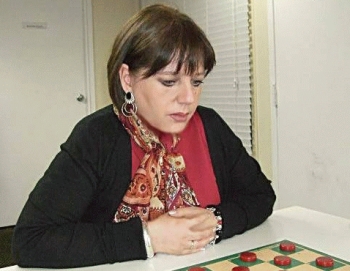
Black: Jan Bulstra
White: Irma Sierra
| 1. | 9-13 | 24-19 |
| 2. | 11-16 | 22-18 |
| 3. | 10-15 |
In this unbalanced 3-move ballot favoring White, 8-11 is the only move to draw at this point. The move played is a probable loss, and Irma takes full advantage.
| 3. | ... | 19x10 |
| 4. | 6x22 | 25x18 |
| 5. | 1-6 | 28-24 |
| 6. | 16-20 | 29-25 |
| 7. | 8-11 | 24-19 |
| 8. | 11-16 |
6-9 or 7-10 could have been played here, but the position is pretty much lost for Black.
| 8. | ... | 18-14 |
| 9. | 4-8 |
Going further astray. 6-9 was a better option in a bad situation.
| 9. | ... | 25-22 |
Irma continues to play very accurately.
| 10. | 7-10 | 14x7 |
| 11. | 3x10 | 22-18 |
| 12. | 6-9 | 18-14 |
| 13. | 10x17 | 21x14 |
| 14. | 9x18 | 23x14 |
| 15. | 16x23 | 27x18 |
White has a commanding position in the center. It's only a matter of time.
| 16. | 13-17 |
Off the mark. 2-6 would be a better choice.
| 16. | ... | 26-23 |
26-22 would have forced a quicker finish after 17-26 30-23 and Black soon runs out of moves.
| 17 | . 2-6 | 18-15 |
| 18. | 17-22 | 23-19 |
| 19. | 6-9 | 14-10 |
| 20. | 9-13 |
This is the end of the recorded game; Black resigned a few moves later. The game might have continued as shown.
| 20. | ... | 32-27 |
| 21. | 5-9 | 27-24 |
| 22. | 20x27 | 31x24 |
| 23. | 9-14 | 24-20 |
| 24. | 14-18 | 20-16 |
| 25. | 18-23 | 16-11 |
White Wins.
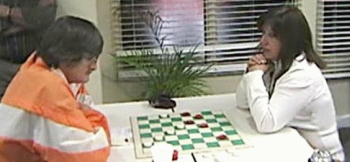
Black: Irma Sierra
White: "Kokomo" a.k.a. Bill Shoffner
| 1. | 11-15 | 22-18 |
| 2. | 15x22 | 25x18 |
White opts for the Single Corner.
| 3. | 10-15 |
8-11 or 12-16 are more common lines but this move can also be played.
| 3. | ... | 18x11 |
| 4. | 8x15 | 29-25 |
| 5. | 4-8 | 25-22 |
| 6. | 8-11 | 24-19 |
23-18 is common here, though the text move is quite good.
| 7. | 15x24 | 28x19 |
| 8. | 9-14 | 22-18 |
The computer suggests 27-24 or even 30-25, but White's move is fine.
| 9. | 6-10 | 18x9 |
| 10. | 5x14 |
The game is being played very accurately by both sides.
| 10. | ... | 26-22 |
| 11. | 11-16 |
One could argue that 11-15 is slightly more accurate, playing into the center.
| 11. | ... | 22-18 |
| 12. | 1-5 |
This returns to a computer book position!
| 12. | ... | 18x9 |
| 13. | 5x14 | 31-26? |
BLACK
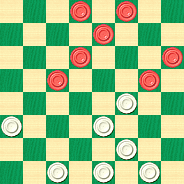
WHITE
White to Play and Draw
W:W32,31,30,27,23,21,19:B16,14,12,10,7,3,2.
We're asking to solve two problems here. First, correct White's 31-26. What should Kokomo have played instead? Second, find the winning line of play for Black after White's 31-26. How can Irma win the game?
WHITE
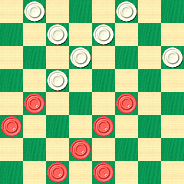
BLACK
Black to Play and Win
B:W32,30,27,26,23,21,19:B16,14,12,10,7,3,2.
When you have your answers, click on Read More to see the solutions as well as the actual conclusion of the game.![]()
3-Move World Championship Scheduled


The following announcement is reproduced with the kind permission of the American Checker Federation. As always, this promises to be an exciting match with checkers played at the highest grandmaster level.
The World 3-Move Title Match between Alex Moiseyev (USA, champion) and Ron King (Barbados, challenger) will be played Oct. 5-15, 2009 in Medina, Ohio, with Oct. 10th as a rest day. Match is 40 games (as needed). Referee is Steve Holliday.
The Rodeway Inn Medina Conference Center, Medina, Ohio, is located on 2875 Medina Road on the Northeast corner of I-71 interchange with state highway 18 (exit 218, just south of where I-71 and I-271 merge). Hotel is a quarter-mile from interchange. Room rates are $49.95 (single or double) per night plus tax. Seven-day rates (no pro-rating) are available for $149.95 plus tax (approx. $169). Phone number for Rodeway Inn is 330-725-4571. Please indicate you are there for the checker match to receive the discount.
For additional info, contact:
Richard Beckwith
(440) 516-1284
e-mail: beckwith24@msn.com
King Me! The Movie
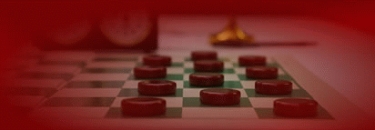
A major checker documentary is in the works. No, we are not kidding! It will be called King Me and you can read all about it on the King Me web site.
Professionally produced by Think Media Studios, the movie is being filmed on location in South Africa, Barbados, Canada, and the U.S. Crews will be at the 2009 U.S. Nationals in August.
No checker fan will want to miss this one. Be sure to follow the film's progress on the website linked above, or on the American Checker Federation site.![]()
The Checker Maven is produced at editorial offices in Honolulu, Hawai`i, as a completely non-commercial public service from which no profit is obtained or sought. Original material is Copyright © 2004-2025 Avi Gobbler Publishing. Other material is the property of the respective owners. Information presented on this site is offered as-is, at no cost, and bears no express or implied warranty as to accuracy or usability. You agree that you use such information entirely at your own risk. No liabilities of any kind under any legal theory whatsoever are accepted. The Checker Maven is dedicated to the memory of Mr. Bob Newell, Sr.

